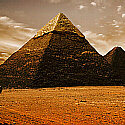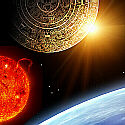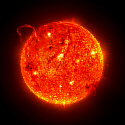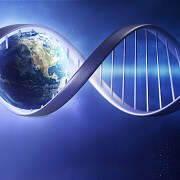What’s In A Name?
By: CK Quarterman
In the beginning (rê’shı̂yth) God (‘ĕlôhı̂ym ) created (bârâ’) the heaven (shâmayim shâmeh) and the earth (‘erets). (Gen 1:1)
The first book of the Bible opens with a statement, “in the beginning God”. Then it states that he “created the heavens and the earth”. When we read this we think the Bible is telling us about the first thing God did, it is not! The Bible unabashedly opens with the fact that God exists.
Beginning (rê’shı̂yth) – principal thing
God (‘ĕlôhı̂ym) – Elohim
Genesis makes no bones about His existence. It states, “Principal thing Elohim”. Therefore, we must take this at face value. There was nothing in existence before God, and then we are told God created. There is much we can learn in this first verse, let us look at it in the Hebrew.
However, Elohim is plural. Why use a plural for a single god? In addition, why this odd plural form of Elohim, it is quite rare in the Hebrew language and no other Semitic language uses this word.
The name Elohim is unique to Hebraic thinking. It only occurs in the Hebrew language and in no other ancient or Semitic language. The masculine plural ending does not mean “gods” when referring to the true God of Israel. When Elohim refers to a singular being (the true God or a false god), it takes a singular verb. When it refers to more than one being, as in the heavenly powers or the human judges, it takes a plural verb. However, considering the Trinity, the form indeed allows for the plurality within the Godhead which is revealed in the New Testament.
In order to understand the ability of this word to refer correctly to God, angels, man, and idols can only be understood, if the root of the word is kept in mind; the root word is El and it means power. In this light, it becomes clear that the Hebrews applied the name Elohim to the true God because it conveyed one of his attributes – power.
The word El in Canaanite or proto-Semitic is from a root meaning power. Therefore, the best understanding of Elohim is, “the all powerful one”.
The name El has to do with the first experience that people had of the powers of nature. The word Elohim is the plural of El. The word El comes from a root meaning power and is the Ugaritic term for god. When used of the true God of Israel, El is almost always qualified by additional words that further define the meaning and distinguish Him from false gods. These other names or titles for God are sometimes called “construct forms” such as Elohei Kedem, God of the beginning; Eternal God such as is used in Deut. 33:27. Elohim very often is accompanied by the article ha-, to mean, “the”.
Interestingly Elohim is used over 7000 times in the Old Testament; Elohim has the two letters “Aleph Tav”, the first and last letters of the Hebrew alphabet, as a grammatical marker. It reminds one of Christ in the Book of Revelation stating that He is the Alpha and the Omega.
To better understand the word Elohim we need to look at Psalm 82:1:
Elohim has taken his place in the assembly of EL, in the midst of the Elohim He holds judgment.
The Syriac version renders it, “In the congregation of angels”
In this psalm, we see God take His place as the leader of the divine council. The psalmist pictures God standing in the “assembly of El” where he accuses the angels of failing to promote justice the on earth, and carrying out their responsibilities (Gen. 6:4). God pronounces sentence upon them, announcing that they the angels will die like men. Their fate for unfairness and wickedness will be to be cast into the Lake of Fire as men are on Judgment Day.
The New Testament gives us a little insight into the Assembly, sometimes known as the Congregation.
“I saw a throne in heaven, and the Ancient of Days sat upon the throne. The throne was similar in appearance to jasper and rubies, and there was a rainbow around the throne, in appearance like an emerald. Around the throne were twenty-four thrones, and on the thrones I saw the twenty-four elders sitting, in white robes; and on their heads were crowns of gold.”
And from the throne proceeded lightnings, voices and thunders. Seven torches of fire were burning before the throne; and before the throne was something like a sea of glass, similar to crystal. And in the midst of the throne, and around the throne, were four living beings. The first living being was like a lion, the second living being was like a calf, the third living being had a face of a man, and the fourth living being was like a flying eagle. And the four living beings, each one having six wings apiece, were full of eyes around and within. And before the throne was a golden altar”.
This is called the Congregation (Assembly). The name arrives from the many which stand before it, a number unnumbered because of the multitudes in attendance. This Council is mentioned several other times where it is called the Congregation. Here we see an example or smaller picture of the Divine Council in action.
And the Ancient of Days said, “Who shall entice this king that he may go and be defeated at Ramoth Gilead?” And one said on this manner; and another said on that manner. And there came forth another, and stood before the Ancient of Days, and said, “I will convince him.”
And the Ancient of Days said to him, “Wherewith?” And he said, “I will go, and will be a lying spirit in the mouth of all his prophets.” And he said, “You will convince him, go now, and do so” and one said, on that manner and another. (1Kings 22)
These were members of the counsel. Not that the Ancient of Days needs advice, he doesn’t, but none the less he chooses to surround himself with others who are called the Elohim.
Again he said, Therefore hear the word of the LORD; I saw the LORD sitting upon his throne, and all the host of heaven standing on his right hand and on his left”. (2Ch 18:18)
Here we see mention of the “host of heaven” (tzeva’ hashamayim) which stands before the Ancient of Days. Clearly, this is speaking of angelic beings, including those on the heavenly divine council. So in this time before time began, before created in Gen. 1:1 which we refer to as from everlasting to everlasting, there was the Ancient of Days, sitting at the head of the Council with the twenty four elders and others. This can all be seen in the Bibles use of the word Elohim.
So to summarize what we see so far is a blank statement that there was nothing in the beginning but the principal thing, God. He stood at the head of the Assembly and was the all powerful one.





